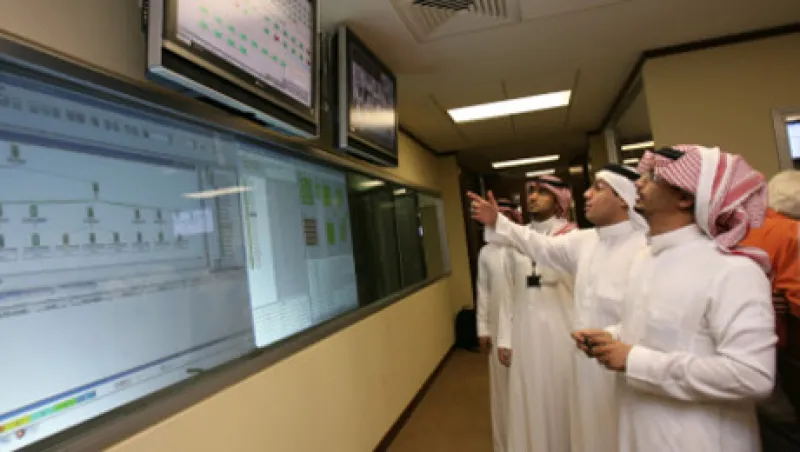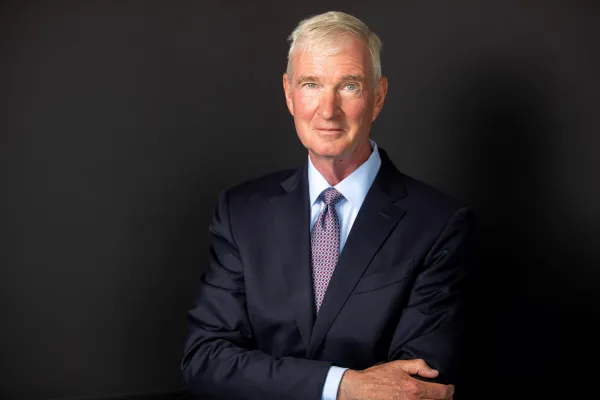John Burbank III was working in his office, with a full view of San Francisco Bay, when he heard the news on July 22: King Abdullah of Saudi Arabia had just announced that he would open the country’s stock market to foreign investors, starting in the first half of 2015. At the offices of Burbank’s Passport Capital, it was high-five time — sort of.
“Sort of” because the $4 billion firm, which specializes in stock picking around the world, has been investing in companies listed on the Tadawul, as the Riyadh stock exchange is called, since 2009 by going through the back door — that is, buying swaps and promissory notes through local brokers. In four of those five full years, the firm generated double-digit returns, partly attributable to long positions in Saudi companies that few other investors knew much about. Saudi stocks currently make up about 10 percent of the firm’s equity portfolios.
Burbank and Passport’s other portfolio managers believed that the Saudi government would eventually allow foreign investors to buy stocks directly. As the firm sees it, the Tadawul contains some of the investment world’s best-kept secrets, with growing industries that aren’t dependent on global growth and a great many undervalued stocks with low correlations to the world markets. So they’ve been investing with an eye toward the day when more foreigners can come in and drive up valuations.
Burbank, the founder and chief investment officer of Passport, says there’s no need to rush out of Saudi Arabia, however. King Abdullah and the Capital Market Authority, a regulatory body that oversees the financial sector, timed the announcement so that investors wouldn’t have much time to take advantage by buying or selling. The Tadawul rose by 4.7 percent between July 21 and July 24, but the exchange closed from July 25 to August 2 for Eid al-Fitr, the holiday marking the end of the Islamic holy month of Ramadan. As it turns out, Passport’s strategy and the Saudi government have this much in common: Both will benefit more from gradual growth than from a stampede of foreign investors.
In the past, the Saudi market has not been for the faint of heart. With domestic retail investors dominating activity, a bull market rally and a spate of initial public offerings drove the market up sharply in the middle of the past decade, only to see the market index drop by more than 60 percent in 2006. The market rocketed again in the second half of 2007 before suffering an even bigger shakeout, plunging by 65 percent between January 2008 and March 2009. Allegations of insider trading and market manipulation were rampant.
Seeking to inject some stability by bringing in outside investors, the CMA relaxed its rules in 2008 to allow foreign investors to have the economic interest of holding stocks without actual ownership, something that remained a political taboo in the kingdom. Passport took advantage of those reforms to gain its Saudi exposure, a move that has paid off handsomely. The Tadawul All Share Index has risen by 147 percent from its 2009 low to stand at 10,214.73; it’s still nearly 13 percent below its January 2008 peak.
The timing of the new announcement might have helped avoid a rush into the market. But most likely the main concern of the king and his economic ministers was to be as low-key as possible about an important economic reform, says Jean-François Seznec, who teaches at Georgetown University’s McDonough School of Business and the School of Advanced International Studies at Johns Hopkins University, and runs the Lafayette Group in Annapolis, Maryland, an investment and consulting firm that specializes in Gulf banking and industrial policy. “Not much happens in the markets during Ramadan, so there wouldn’t be many people around to complain,” says Seznec.
Saudi Arabia’s ministers, with King Abdullah setting the tone, have adopted a National Industrial Strategy. One of the plan’s stated goals is to increase the size of the manufacturing sector to 20 percent of the economy by 2020, up from its present 11 percent. The opening of the stock market is part of a series of reforms, which also include labor and mortgage lending reforms, aimed at attracting foreign direct investment to help build the manufacturing sector and ease the economy’s dependence on oil exports. Still, there is a conservative faction in the country that is more skeptical of foreign ownership than are King Abdullah, who turned 90 on August 1 and is in ill health, and his two designated successors, 79-year-old Crown Prince Salman, followed in line by 68-year-old Deputy Crown Prince Muqrin. With two thirds of the population under the age of 30, the country struggles with creating enough jobs for its youths. The economic reforms are an effort to ward off high unemployment, and with it the potential for a youthful rebellion.
The anticlimactic announcement is making life easy for Passport’s portfolio managers. They can hang on to their Saudi holdings for now and wait to see where prices go. The firm’s flagship Passport Global Strategy, which invests in global equities through long and short positions, rose 23.02 percent last year, fueled in part by investments in individual Saudi companies such as Mobily, the country’s second telecoms license holder, and the Al Tayyar Travel Group, both based in Riyadh. Burbank estimates that if the MSCI adds Saudi Arabia to its Emerging Markets Index, the stock market, now worth roughly $530 billion, would get about $35 billion to $40 billion in outside investor flows. But as of now foreigners, and institutions in general, own a small percentage of the market, and share prices are driven largely by local retail investor sentiment. “We’re a long way from stocks being efficiently priced by professional investors,” says Burbank. He is still bullish on the potential for stocks in such industries as chemicals, mobile phones and travel services, particularly companies that are doing a good job of tapping the domestic consumer market.
“We like the domestic economy, and it has been the focus of our investment in the region,” says Burbank. As the market opens, however, they will also keep their eyes on the stocks that new foreign investors are most likely to buy. “That will probably be the more liquid and easy to understand companies, such as petrochemicals and banks,” he says.
Follow Jan Alexander on Twitter at @jananyc.






